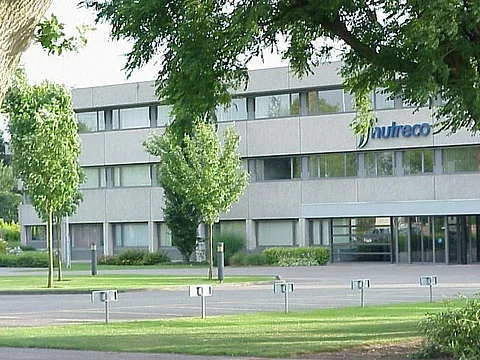

Nutreco's cell feed production plant in Boxmeer, The Netherlands, the world’s first dedicated food-grade powder production.
Photo: Nutreco.
Nutreco announced yesterday that it has completed the construction of the world’s first dedicated food-grade powder production facility for cell feed in Boxmeer, The Netherlands, and has started commercial operations. This new food-certified production plant produces the first cell feed product developed specifically for the cell-cultured meat industry, a first for both the industry and the feed company.
"At Nutreco, in addition to our passion for the aquaculture, animal nutrition and companion animal industries, and our expertise in helping our customers increase their productivity and reduce their environmental footprints, we are committed to playing a key role in the development of new solutions and have taken the next step on our innovation journey with this new facility," the company claimed in the release announcing the opening.
As Susanne Wiegel, Head of Alternative Protein Program at Nutreco, pointed out, the cell-cultured protein industry is in its development stage and one of its biggest challenges is how to feed protein cells cost-efficiently, sustainably, and at scale.
"We see potential for this industry to be one solution to the challenge of feeding the rising global population and are committed to helping the industry grow by becoming a supplier and a solutions provider," she added.
So far, the team at the new Boxmeer facility has successfully produced the first commercial batch of 50 kilograms of cellular feed but the plan is to produce several 100 kilograms per week and to grow further in pace with the cellular agriculture industry.
Nutreco stated that while this is a small portion of the total 9 billion kilograms of products it produces each year, there is great potential to scale further with attractive margins and contribute to the growth of this fledgling industry.
"We must continue to drive productivity and reduce the environmental footprints in the animal protein value chain, and produce protein from more and more varied sources – animals as well as alternative sources of protein such as plant-based protein, meat or seafood developed from animal cells and protein produced through fermentation," explained for his part Nutreco's newly appointed CEO, David Blakemore.
"Our investments and innovation in the cell-cultured protein industry are just one way we're tackling the challenge," he added.
As Erik Tveteraas, current Director of Venturing at Nutreco explained to WeAreAquaculture in his TalentView interview, starting in 2019 the feed company broadened the scope beyond what is closely related to the core business and started investing in alternative proteins from edible cell-grown meat or fermentation-based meat production, and in alternative aquaculture technologies.
Although he acknowledged that it was something of a paradox to invest in technologies that can be considered as "disruptive or even cannibalistic to our own feed industry," Tveteraas - then the Investment Director at Nutreco - explained it easily: "We think it's better to be a part of that development, to be a relevant player in that industry trajectory, and also eventually to become a supplier and a partner to companies in the cultured meat and alternative aquaculture space".
Just two years ago that statement was made, and Nutreco is already producing the first cell feed product. Although developed specifically for the cell-cultured meat industry, from David Blakemore's statements it can be deduced that the company is not forgetting the seafood sector. Will this new move by Nutreco affect aquaculture feeds?
A recent IFFO-led study claimed there is an "urgent need" for greater volumes of new aquafeed protein sources. The authors suggested that "non-competing" resource production should be further developed, that is, creating new resources for feed that are not already part of the human food production system, and this is where innovation in alternative protein sources, such as single-cell protein from bacteria, microalgae, and yeasts, has a role to play.
